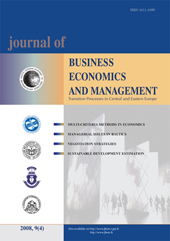Managing the Organizational Change and Culture in the Age of Globalization
Managing the Organizational Change and Culture in the Age of Globalization
Author(s): Mirjana Radović-MarkovićSubject(s): Economy
Published by: Vilnius Gediminas Technical University
Keywords: globalization; organization; corporate culture; communication; global management; entrepreneurial skills; knowledge management
Summary/Abstract: Based on her research, Dr Radović Marković tried to make a profile of a successful organization which will be in the best way adopted to business environment in the new economy. Namely,in order to get a complete picture how the winning organization will look like in the future, the author concluded that the successful companies in the future will be the ones which are wise enough to harness the full potential of the entire organization in the rapidly changing business environment .It means that the winners will be the unbridled firms that are responsive to challenges and adroit in both creating opportunities and capturing them. In other words, to match the business environment that is more networked within and among companies, the ability to manufacture value will have to be distributed across the company to a much greater extent than in the past. Under these circumstances, managers need to transform themselves, too. They need to have a better framework for thinking about and understanding organizational change. Additionally, continuous learning is the key competency required by any organization that wants to survive and thrive in the newknowledge economy. Market champions keep asking learning questions, keep learning how to do things better, and keep spreading that knowledge throughout their organization. Knowledge organizations obtain competitive advantage from continuous learning, both individual and collective, concluded Dr.Radović Marković.The author also stresses that it is necessary to determine general personal knowledge and education, then to examine knowledge or various specializations in certain areas and lastly to identify their skills. Recent researches in the USA show that business owners who were not educated enough for the business in which they were engaged, were not successful (80 % of their businesses failed during the first year of their existence). On the opposite, those entrepreneurs who were educated and who showed constant interest in improving their activities have increased their business success by 60 % after the completion of the basic training programs for entrepreneurship and management. Therefore the author pointed out that more highly skilled workforce should be beneficial to organizations. Additionally, the human capital approach reflects the view that the market value of the firm increasingly depends on intangible rather than tangible resources. The three main components of human capital are described as a) early ability, b) qualifications and knowledge acquired through education and c) skills, competencies and expertise through on-and off-the-job training. This would suggest that individual capability is enhanced by greater qualifications and higher skill levels. If this can be assessed and used in good effect in the firm then better human capital should, ceteris paribus, enhance organizational performance. Better organizational performance should, in turn, translate into better national performance.
Journal: Journal of Business Economics and Management
- Issue Year: 2008
- Issue No: 1
- Page Range: 3-11
- Page Count: 9
- Language: English

